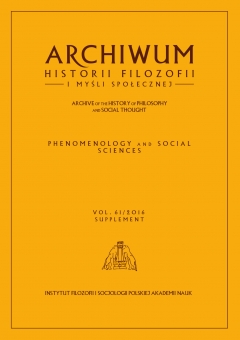Cultural Being: Heidegger’s Hermeneutical Conception of the Human
Cultural Being: Heidegger’s Hermeneutical Conception of the Human
Author(s): Ms. KarilemlaSubject(s): Phenomenology, Hermeneutics, Ontology
Published by: Instytut Filozofii i Socjologii Polskiej Akademii Nauk
Keywords: Heidegger; Ontic; Ontological; Cultural Being; Everydayness; Tradition; Fallenness; Historicity;
Summary/Abstract: Heidegger was averse to the use of terms like “culture” and “worldview” because of the misleading connotations they had accumulated with modernity and its technological culture. He sees the ideas of culture and worldview as born within the story of the conquest of the world as technologically representable picture. Despite Heidegger’s own reservations about the term “culture”, this paper argues that his hermeneutic phenomenology can provide adequate phenomenological ground for genuine and ontologically significant difference in our cultural experience of the world. Dasein accesses and hence knows all phenomena from the background of a shared hermeneutical horizon. Heidegger describes Dasein as fallen into and lost in this shared horizon. The lostness of everyday Dasein in its world is the basis for phenomena to appear to Dasein meaningfully. Heidegger describes worldformation as a sort of pre-cognitive socialization that happens to every Dasein receptively rather than cognitively. As Dasein the human being is transcendence towards the world, and hence the unified expression of Dasein as “Being-in-the-world”. The ontic dimension of this ontological structure of Dasein means that Dasein is constantly involved in its practical world of concerns. I read the ontic dimension of Dasein’s world of involvement as culture and thus Dasein as the cultural Being. The cultural horizon is never static, just as the world in its ontological sense never is. Both ontologically and ontically Dasein is historical, a particular tale that can be recorded reflectively. Although Dasein’s ontico-ontological horizon is never closed off, we can genuinely record the differences in these horizons, their histories and meanings, without having to plunge hopelessly into any triumphalist universalism. This wouldn’t be the case if Dasein were not ontologically historical and ontically cultural.
Journal: Archiwum Historii Filozofii i Myśli Społecznej
- Issue Year: 2016
- Issue No: 61supl.
- Page Range: 107-123
- Page Count: 17
- Language: English

